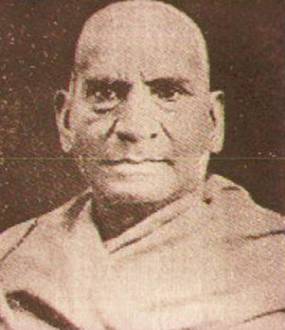Swami Shraddhanand
Swami Shraddhanand (1856–1926) was an Indian educationist, freedom fighter, and a prominent leader of the Arya Samaj, a Hindu reform movement. He was born as Munshi Ram Vij in Talwan, Jalandhar district, Punjab, British India. Swami Shraddhanand played a significant role in the Indian independence movement and was a strong advocate for social reforms, particularly in the areas of education and religious conversion.
Early Life[edit | edit source]
Swami Shraddhanand was born on February 22, 1856, in a Khatri family. His father, Lala Nanak Chand, was a police officer in the British Indian administration. Munshi Ram received his early education in Jalandhar and later moved to Lahore for higher studies. He was deeply influenced by the teachings of Swami Dayananda Saraswati, the founder of the Arya Samaj.
Arya Samaj and Social Reforms[edit | edit source]
Swami Shraddhanand joined the Arya Samaj in 1882 and became an active member. He was instrumental in promoting the Vedic principles and worked tirelessly for the upliftment of the Dalits and other marginalized communities. He established the Gurukul Kangri University in Haridwar in 1902, which became a center for Vedic education and Indian culture.
Role in Indian Independence Movement[edit | edit source]
Swami Shraddhanand was a staunch supporter of the Indian National Congress and participated in various movements against the British Raj. He was a close associate of leaders like Mahatma Gandhi and Bal Gangadhar Tilak. He played a crucial role in the Non-Cooperation Movement and was imprisoned several times for his activities.
Shuddhi Movement[edit | edit source]
One of Swami Shraddhanand's most significant contributions was the Shuddhi Movement, aimed at reconverting Hindus who had converted to other religions back to Hinduism. This movement was particularly active in the Punjab and United Provinces (now Uttar Pradesh), where large-scale conversions had taken place.
Assassination[edit | edit source]
Swami Shraddhanand was assassinated on December 23, 1926, by Abdul Rashid, a fanatic who opposed his activities related to the Shuddhi Movement. His death was a significant loss to the Arya Samaj and the Indian independence movement.
Legacy[edit | edit source]
Swami Shraddhanand's contributions to education, social reform, and the Indian independence movement are remembered and celebrated in India. Several institutions and roads are named after him, and his life and work continue to inspire many.
See Also[edit | edit source]
- Arya Samaj
- Swami Dayananda Saraswati
- Gurukul Kangri University
- Indian independence movement
- Shuddhi Movement
References[edit | edit source]
External Links[edit | edit source]
Search WikiMD
Ad.Tired of being Overweight? Try W8MD's NYC physician weight loss.
Semaglutide (Ozempic / Wegovy and Tirzepatide (Mounjaro / Zepbound) available. Call 718 946 5500.
Advertise on WikiMD
|
WikiMD's Wellness Encyclopedia |
| Let Food Be Thy Medicine Medicine Thy Food - Hippocrates |
Translate this page: - East Asian
中文,
日本,
한국어,
South Asian
हिन्दी,
தமிழ்,
తెలుగు,
Urdu,
ಕನ್ನಡ,
Southeast Asian
Indonesian,
Vietnamese,
Thai,
မြန်မာဘာသာ,
বাংলা
European
español,
Deutsch,
français,
Greek,
português do Brasil,
polski,
română,
русский,
Nederlands,
norsk,
svenska,
suomi,
Italian
Middle Eastern & African
عربى,
Turkish,
Persian,
Hebrew,
Afrikaans,
isiZulu,
Kiswahili,
Other
Bulgarian,
Hungarian,
Czech,
Swedish,
മലയാളം,
मराठी,
ਪੰਜਾਬੀ,
ગુજરાતી,
Portuguese,
Ukrainian
Medical Disclaimer: WikiMD is not a substitute for professional medical advice. The information on WikiMD is provided as an information resource only, may be incorrect, outdated or misleading, and is not to be used or relied on for any diagnostic or treatment purposes. Please consult your health care provider before making any healthcare decisions or for guidance about a specific medical condition. WikiMD expressly disclaims responsibility, and shall have no liability, for any damages, loss, injury, or liability whatsoever suffered as a result of your reliance on the information contained in this site. By visiting this site you agree to the foregoing terms and conditions, which may from time to time be changed or supplemented by WikiMD. If you do not agree to the foregoing terms and conditions, you should not enter or use this site. See full disclaimer.
Credits:Most images are courtesy of Wikimedia commons, and templates, categories Wikipedia, licensed under CC BY SA or similar.
Contributors: Prab R. Tumpati, MD





